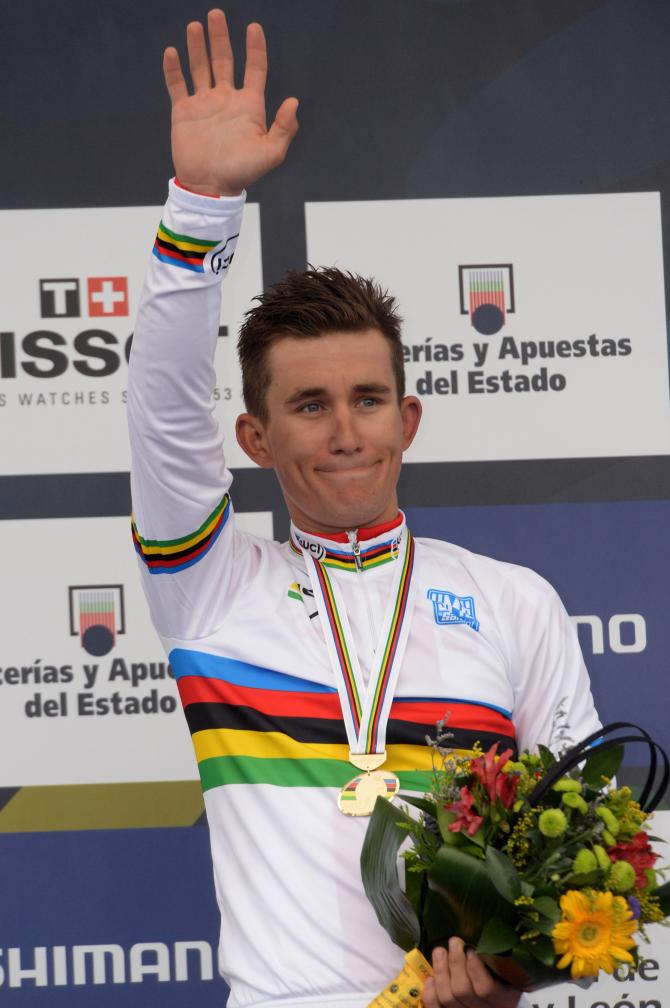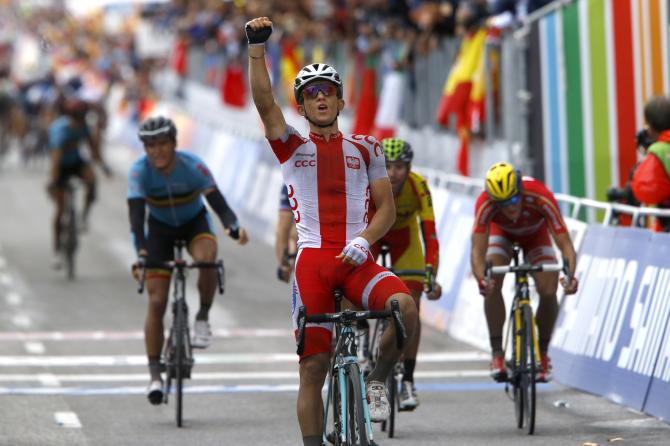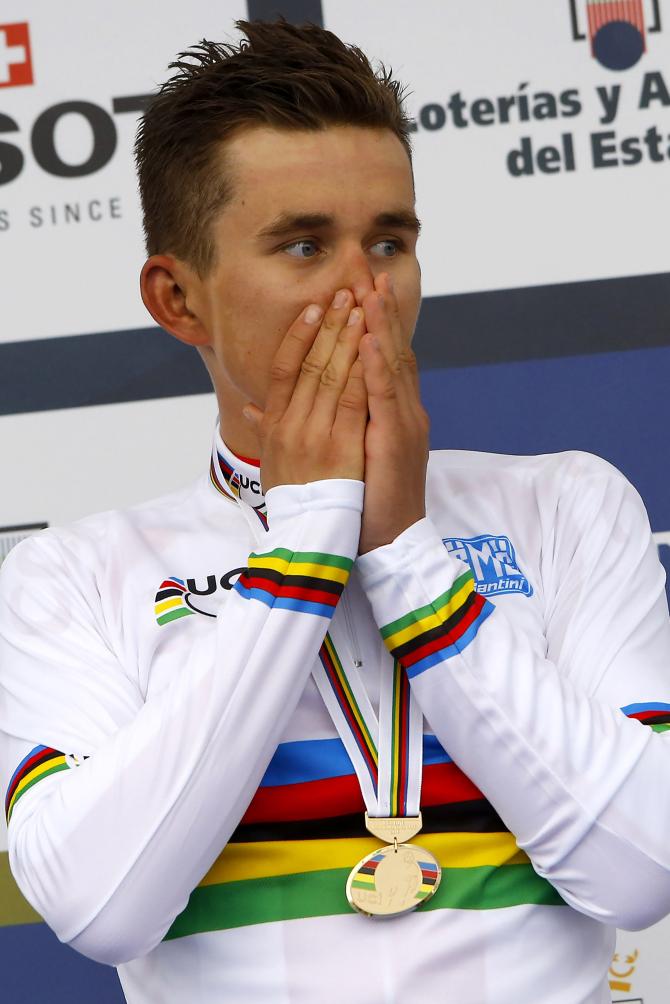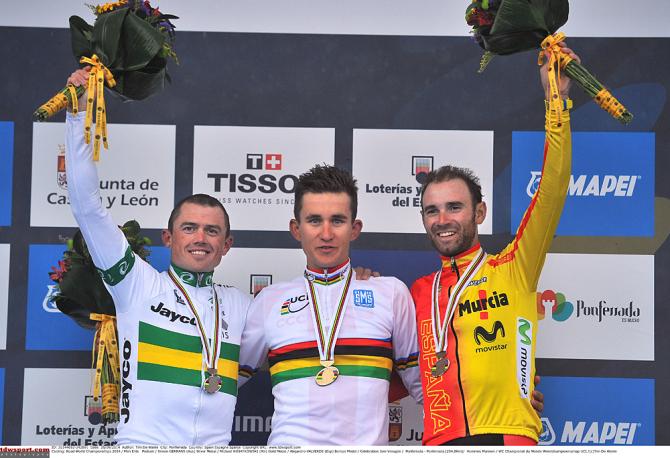Kwiatkowski takes Poland’s first-ever road race victory at Worlds
Pole outpowers pack for impressive solo win




Nine years after watching his childhood hero Tom Boonen win the rainbow jersey in Madrid, Michal Kwiatkowski struck gold himself in the elite men's road race at the World Championships in Ponferrada, Spain, as he crossed the finishing line one second ahead of the pack.
Back in 2005, prior to his Worlds win in Madrid, Kwiatkowski’s Omega Pharma-QuickStep teammate, Boonen, had already taken the Tour of Flanders, Paris-Roubaix and two stages of the Tour de France in the same breakthrough season.
For Kwiatkowski, leading Tirreno-Adriatico in 2013 for two days and wearing the Tour’s young rider jersey last year along with an 11th place in Paris, had already raised his profile amongst cycling fans.
This year went even better as a string of solid results in races like the Tour of Britain, Tour of Romandie and Tour of Algarve, as well as claiming his first Monuments podium with third in Liège-Bastogne-Liège, saw the young rider take another big step forward.
Kwiatkowski, 24, is the same age as Boonen was in Madrid when the Belgian turned in a winning performance that inspired him to race at age 15, and he has now made the 2014 World Championships his breakthrough success at cycling’s highest level.
His success also breaks an important glass ceiling for Poland in a year already marked with victories in the Tour for compatriot Rafal Majka and in the Vuelta’s legendary summit finish of the Covadonga for Przemyslav Niemiec.
Poland’s first-ever gold medallist in the elite men’s road race at Worlds, Kwiatkowski is also the first Pole to take any medal in the event since compatriot Zbigniew Spruch finished silver in Plouay behind Romans Vainsteins back in 2000.
Get The Leadout Newsletter
The latest race content, interviews, features, reviews and expert buying guides, direct to your inbox!
Poland's race for the world title
Kwiatkowski’s blistering solo attack on the descent of the Confederacion climb on the last lap was not the first time that Poland had come to the fore in the championship race. Prior to a big acceleration by Italy, Kwiatkowski’s eight red-and-white clad teammates had been working hard in the first third to try and pull back an early four-man break.
“As a team we did an incredible job today,” Kwiatkowski said afterwards. “We were trying to control the bunch the whole day, we were just on the front all time.
“I hadn’t planned that attack on the second last descent but I saw the opportunity to get in front, and I took it.”
Once Kwiatkowski’s high-speed downhill attack had allowed him to go clear, he then moved across to the four riders left ahead of him that included Vasil Kiryenka (Belarus), Alessandro De Marchi (Italy), Cyril Gautier (France) and Michael Valgren Andersen (Denmark).
“It was important to be in the front anyway, you had to have open eyes on a course like today because nobody could say what would happen.
“There were four riders ahead, I thought if I caught them then I could relax a little bit, and then I could go for it on the final climb.”
He had nine seconds at the summit of the Mirador climb and said, “I knew I had a little bit of an advantage, so I knew it could be really difficult to chase me down.
“I had seen the U23 race and I thought it was actually possible. I am not the best sprinter, anyway and fighting against Simon Gerrans and Alejandro Valverde would have been very difficult.
“I felt so much pain after that last descent, one and a half kilometres is a long way to go. I had a little bit of an advantage and I knew it was everything or nothing. I took a little risk, but it worked, and I just don’t know how I made it.”
As Kwiatkowski recognised, he took some serious risks, but he didn’t want to think too hard about that. “I didn’t look back many times, I didn’t know what was going on behind, if some nations are trying to chase me down. I was just more focussed on what I had to do.”
End-of-season strategy pays off for Kwiatkowski
After an uneven Tour de France this summer, in which he finished 28th, Kwiatkowski said that the one bonus was that he and his OmegaPharma team had thought hard about how to tackle the rest of the season.
“I didn’t learn anything tactically from the Tour, it’s a different kind of race. But I had had such a great first part of the season, maybe I was tired in July because of that.
“Actually, I’m happy about that Tour because it meant we thought very hard in my team about how to be better for the Worlds. I took a proper break after the Tour, a week off the bike before going to do altitude training for the first time in my life, in Livigno [Italy] for two weeks.
“I was good in Plouay, then the Tour of Britain was very good for our team, we got three stage wins and I got second overall. I was focussed on the team time trial title here where we got bronze [with OmegaPharma-QuickStep], which was good.
“On Wednesday, I did six hours of training with the Belgian national team and then I spent the last four with the Poles.”
Asked if he would change as a person now that he will wear the coveted rainbow jersey for 12 months, Kwiatkowski smiled and said, “Actually I want to stay as the same guy.
“Maybe I should ask my teammate Tom Boonen about how he felt after winning in 2005 in Madrid.”
In taking a rainbow jersey at such a young age in Spain, Kwiatkowski has already followed in his OmegaPharma-QuickStep teammate’s tracks in the most successful way possible.
Alasdair Fotheringham has been reporting on cycling since 1991. He has covered every Tour de France since 1992 bar one, as well as numerous other bike races of all shapes and sizes, ranging from the Olympic Games in 2008 to the now sadly defunct Subida a Urkiola hill climb in Spain. As well as working for Cyclingnews, he has also written for The Independent, The Guardian, ProCycling, The Express and Reuters.
